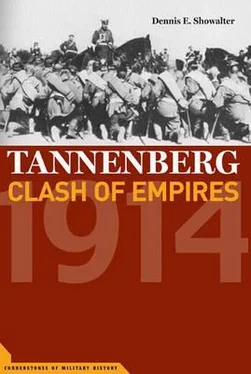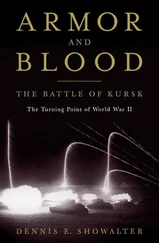By 1912 the Balkan tail was beginning to wag the Russian and European dogs. The network of alliances constituting the Balkan League, concluded between March and October, were negotiated independently of Russian ambassadors and the Russian foreign office. To Sazonov’s anxious inquiry whether things were still as they had been in 1910 at Potsdam, Bethmann replied that Germany was as little interested as ever in encouraging a forward policy in the Balkans from any quarter. But when the Balkan League went to war with Turkey on October 17, Russia faced a choice that was no choice at all. 38
As states in whose welfare she had expressed constant interest won victory after victory, Russia could not very well deny her approval. Yet from the war’s first days Serbia’s determination to secure an Adriatic outlet clashed with Austria’s fear that a Serbian port might soon become a Russian one, and with Austria’s determination to maintain her Balkan position in the face of the League’s unexpected ascendancy. During a visit to Berlin a few days before the war’s outbreak, Sazonov had suggested that if Austria were only patient she might eventually act as the powers’ executor in limiting Serbian gains in the peninsula. 39But in October, 1912, the Russian general staff ordered a practice call-up of reserves in Russian Poland. On November 10 the war ministry authorized the temporary retention with the colors of 400,000 men whose terms of active service were expiring. Since the entire Austro-Hungarian army had no more than 350,000 men under arms on a normal peace footing, the gesture could hardly be ignored in Vienna. Reinforcements were dispatched to the major eastern garrisons: Cracow, Lemberg, Przemsyl. The formations stationed in Bosnia-Herzegovina and Dalmatia were also put on a full war footing. 40
Russia’s decisions contrasted sharply with Germany’s behavior during the Agadir crisis the previous year. Yet the entire process initially had a certain air of unreality as far as Germany was concerned. Reservist call-ups were common practice for all of Europe’s conscript armies. This one was accompanied by reports of discontent and indiscipline amounting to mutiny in some cases—reservists allegedly assaulting officers and declaring that in case of a war they would know whom to shoot first. 41When the Austrian chief of staff made a quick trip to Berlin to consult his colleague, it was without the knowledge of the German government, which instructed its ambassador in Vienna to make it clear that post facto reports of such conferences were highly inappropriate. 42In mid-November Pourtalès could still quote the Austrian military attaché in St. Petersburg as believing that Russia was not planning a mobilization. A “high general staff officer” expressed his preference for dealing with Austria in two years, but this was familiar rhetoric. The Austrians were even wondering whether they were not ahead of Russia in preparations for an eventual war. Then on November 22, Tsar Nicholas approved the ordering of mobilization in the military districts of Kiev, Odessa, and Warsaw. 43
This decision, urged by the generals, was checked only by the impassioned pleas of Sazonov and Kokovtsov. Kokovtsov’s account, the most detailed and the most familiar, is an exaggerated contrast of bloodthirsty soldiers to peace-loving statesmen. Ernest R. May interprets the incident as manifesting the structural weakness of Russia’s decision-making process. May argues that bureaucratic infighting encouraged concealing information—in this case the information that no one at the meeting, civilian or military, actually wished or intended to start a war in support of Serbia’s regional pretensions. 44But the conference did not take place in a vacuum.
France had, on the whole, remained conciliatory in its direct relations with Germany after 1906. The republic’s long-time ambassador to Berlin, Jules Cambon, consistently and successfully warned his government against overreacting to the kaiser’s bluster. This, however, did not portend rapprochement. A reviving French nationalism was becoming an increasingly powerful force for anti-German sentiments and policies. Relations between the business and financial communities strained as they came into direct competition in the Near East. The French foreign office included a new generation of fire-eaters: young Germanophobes permanently convinced of Germany’s ultimately evil intentions. Moreover, if the ententes of 1904 and 1907 had considerably improved France’s diplomatic position, they were by no means ironclad guarantees. French diplomats recognized the instrumental character of their British connection. They retained enough respect for the German foreign office not to discount the possibility of Anglo-German rapprochement. The Franco-Russian relationship also seemed far more fragile in Paris than it appeared to Berlin, especially, in the minds of many professional diplomats, because it had to be defended against Radical politicians who dominated the cabinets after 1906, and tended to regard Tsarist Russia as morally and politically disgusting, an unreliable creditor and an ally from stark necessity. A major goal of French foreign policy in the three years before the outbreak of world war was to exercise a greater degree of control over her increasingly wayward eastern ally. This in turn meant maintaining, even enhancing, ties of friendship and good will 45
This attitude was strengthened and supported by the evolution of the French army’s strategic and tactical doctrines after Joseph Joffre’s appointment as chief of staff in 1911. Joffre’s commitment to the offensive as the only way to break an enemy’s power and will was significant in view of the confidence he enjoyed in cabinet and parliament alike as a symbol of Republican virtue in uniform. Revised under his supervision, French strategy increasingly focussed on an all-out attack against Germany, an attack geographically limited to Lorraine only because Joffre’s repeated proposals to include south Belgium were rejected as fatal to France’s British connection.
Britain’s insistance that a pre-emptive French move into Belgium would result in a British declaration of neutrality only highlighted France’s concern for the military strength of the Dual Alliance. French prospects for success might not depend entirely upon the diversion of German troops to other theaters. They would, however, be significantly enhanced. This fact helps explain the optimism expressed by the French general staff in the summer of 1912 when considering the prospect of general war over the Balkans. With a good part of Austria’s army presumably pinned down by the forces of the League, with the bulk of Germany’s troops destined for the western theater, French experts reasoned that Russia should have excellent chances for victory in both Galicia and East Prussia—victories that would force Germany to reduce her strength on the French front and facilitate a decisive French breakthrough. 46
France’s premier and foreign minister, Raymond Poincaré, was hardly interested in giving Russia a free hand in the Balkans or anywhere else. But his fear of German intentions temporarily outweighed his fear of Russian behavior. Far from concealing the soldiers’ potentially explosive vision, Poincarè not only circulated it to his ambassadors, but informed the Russian envoy in Paris. That man was Izvolsky, whose fall from office had been cushioned by comfortable exile to the Quai d’Orsay. Still smarting over his humiliation in 1908, he was hardly likely to refrain from passing the information to his successor. 47
Lest the implication be mistaken in Berlin and Vienna, Russia’s Grand Duke Nicholas was France’s guest at her grand maneuvers in September. The duke’s entourage, particularly his wife, a Montenegran princess, indulged in a spate of anti-German outbursts as extreme as anything heard at a French official function since the days of Boulanger. Senior Russian officers boasted to anyone within hearing that the military situation was highly favorable; all they needed to do was push the button—which they did in October and November. As late as December 26, War Minister V. A. Sukhomlinov described to the French military attaché’s adjutant his intention to rub Germany’s nose in Russia’s readiness for war—ironically, during a forthcoming official visit to celebrate the Russo-Prussian victory over Napoleon a century earlier. 48
Читать дальше












